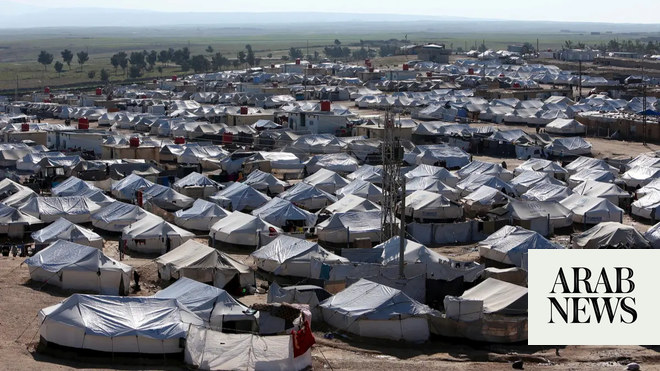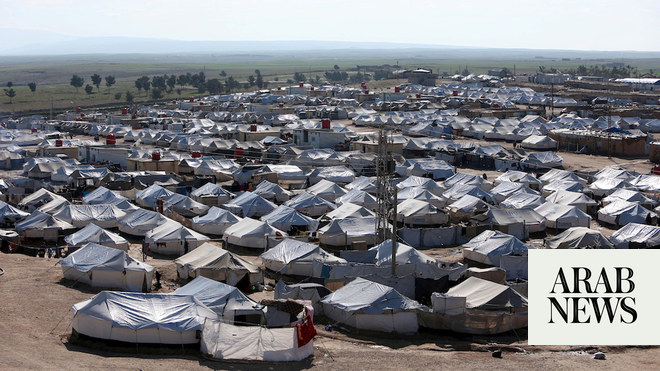
Children could become ‘ticking time bombs’ unless taken back to the West
LONDON: British children are being held in Syrian camps meant for Daesh members, where they face malnutrition, poor sanitation, the threat of COVID-19 and worsening weather, according to a report by the Egmont Institute, a Belgian think tank.
Several children have already died in the camps, including the infant son of British Daesh member Shamima Begum.
The UK’s refusal to repatriate them or their parents risks the prospect of mass breakouts of the “most dangerous terrorists in the world,” the report said.
It added that the conditions that led to the creation of Daesh, through mass networking and radicalization in overcrowded prisons administered by the US in the aftermath of the 2003 invasion of Iraq, were being repeated in the camps in Syria.
The institute said the camps currently contain 35 British children and 24 adults, 15 of whom are women. In total, over 600 children of EU nationals have been accounted for.
“The majority of (the children) are below five years old, and they have every chance to fully re-socialize in their home countries,” the report said.
“Children are not ‘ticking time bombs,’ but they could become ones if we do not bring them back.”
The report condemned Western states for refusing to repatriate Daesh members and affiliates, and in some cases strip them of citizenship, in order to avoid what it called “political suicide” for those elected officials responsible for taking the decision.
“During their detention period, in Syria or Iraq, European fighters will continue to be at risk of further radicalization and networking with other foreign Isis (Daesh) inmates,” wrote the report’s authors Thomas Renard and Rik Coolsaet.
“The only question we should ask ourselves is whether we are willing to abandon any form of control on European foreign fighters, at the risk to see them come back in some years even more radicalized, or if we’d rather take back control to ensure their proper prosecution, detention and rehabilitation.”
In July, a number of prominent UK politicians wrote to the government highlighting the dangers posed by continuing to leave British and EU Daesh members in Syria.
The MPs, including former Conservative government ministers Tobias Ellwood, David Davis and Andrew Mitchell, said: “We are concerned that their current indefinite detention in increasingly precarious Kurdish detention camps poses a significant security challenge to the UK, as well as significant harm to the children involved.
“We urge you to ensure that these individuals are brought back to the UK so that any adults accused of crimes can be fairly prosecuted with due process, and the children’s safety is ensured.”
The threat of mass escapes has risen exponentially in recent months, with a recent US military report highlighting the deteriorating situation across many of the Kurdish-controlled camps.
Kurdish authorities have repeatedly called on EU countries and the UK to repatriate some or all of their citizens held in Syria to alleviate pressure and free up resources in the ongoing conflict.
Two women from the UK and Ireland, along with their children, were among roughly 750 women and children who escaped from the Ain Issa camp after Turkish forces invaded the area last October.
The whereabouts of most are unknown, with many thought to have tried to re-join jihadists in northern Syria.
Violence and insurrection have frequently broken out at other camps for former Daesh members, including at Al-Hol, which holds in excess of 65,000 women and children, and at Hasakah, the main center for captured Daesh fighters.
The Egmont Institute report said COVID-19 also poses a severe risk to the camps’ viability. “There are concerns that measures to prevent the spread of COVID-19, such as less physical contact between guards and prisoners, might facilitate (an) informal power grab by (Daesh)-linked groups and exacerbate a permissive environment for criminal activity,” it added.
A spokesperson for the UK government said: “Our priority is to ensure the safety and security of the UK. Those who remain in Syria include some of the most dangerous individuals who chose to stay to fight or otherwise support a group that committed the most atrocious crimes including butchering and beheading innocent civilians.
“The government has been clear that they should face justice for their crimes in the most appropriate jurisdiction, which will often be where their offenses have been committed.”












